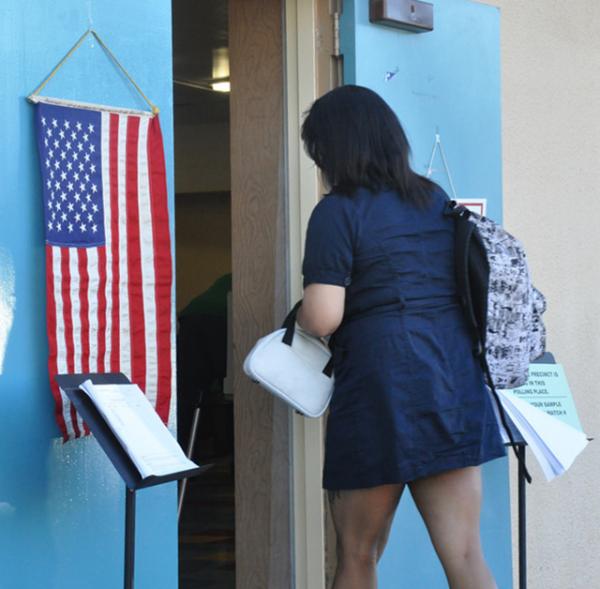KID REPORTERS’ NOTEBOOK
Young Voters in California Express Their Views


A young voter, smartphone in hand, heads to a polling place in Los Angeles on June 7.
The June 7 primary elections in California resulted in Democrat Hillary Clinton and Republican Donald Trump all but securing the nominations of their respective parties. With the presidential election shaping up to be a divisive contest, it’s up to voters to determine the country’s future.
What issues do California voters care about the most? “I’m concerned that the middle class is shrinking,” says Alice Chen, an eighth-grade Language Arts teacher at Suzanne Middle School in Walnut, California. “Our social structure is skewed. There needs to be more distribution of wealth.”
Gabriel Combs Morris, the former Junior State of America (JSA) Chapter President at the Orange County School of the Arts (OCSA), says that “the biggest concern I have for this country is hate, and fear of what is different. This hate and fear manifest themselves in many different ways and through many different forms of oppression: racism, sexism, homophobia, transphobia, Islamophobia, and mass xenophobia. We must find unity and respect for our differences if we are to have any hope.”
For many, hope seems to lie in the next generation. David Roudebush, who is also part of OCSA’s JSA chapter, recently organized a fair to inform students about politics and encourage the mindset that young people have the power to affect the political system in the United States. The fair consisted of booths run by local political activists.
“Politics is often a touchy subject that is ignored or avoided in everyday discussion,” Roudebush says. “It’s important to give students an opportunity to express their political views in a respectful manner and to learn about the political views of others. Anyone can impact the workings of the government and help make the United States of America a better place.”
SEEKING SOCIAL JUSTICE
In the 2012 presidential election, only 19 percent of eligible voters ages 18-29 cast ballots. However, many people believe that change is in the air thanks to the progressive culture of millennials. Bianca Bulic, an Advanced Placement U.S. History teacher, has faith in the rising generation due to her interactions with high school students.
“There is a change coming with the next generation,” Bulic says. “They are very different from their predecessors in terms of the vision that they have for their country.”
Indeed, students like Gabriel actively raise awareness about the importance of voting through JSA weekly club meetings, seasonal conferences, and other activities. “Today’s students are far more concerned about social justice,” says Gabriel. “These things are very positive, and as we occupy a greater position in the country as we come of age, I think that change will be effected, and I’m excited for the future.”
Gabriel encourages all young people who are eligible to vote to do so. “If [millennials] show up and make their voices matter, young people like me will have the ability to really shape not only the vote count, but the policy of the next president,” Gabriel adds. “I would say to those who are apathetic: 'Get to the polls because it’s your duty and your privilege. Millions of people over the history of humanity have died for the right to have their voice heard by their government. You have this right—use it.’”
